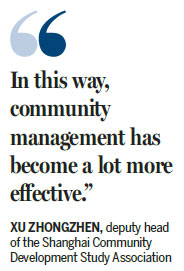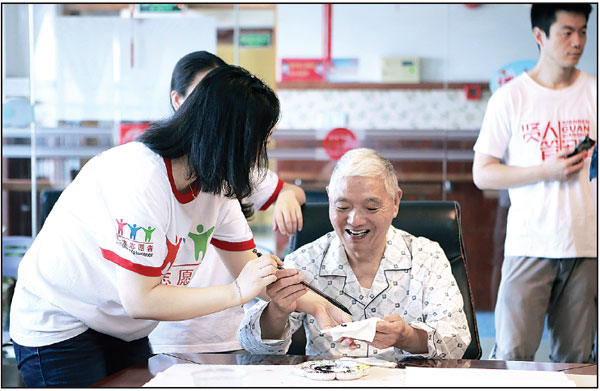Offering a better quality of community funding
Updated: 2015-01-08 07:50
By Wu Yiyao In Shanghai(China Daily USA)
|
||||||||
|
Volunteers from HSBC Bank (China) Co Ltd help a senior citizen in a community in Shanghai in August 2014. Provided To China Daily |
This year promises to be even busier than last for 64-year-old Suzhou resident, Wang Jihua.
He is leader of an art group in the city that has more than 20 members.
Having managed to attract a healthy amount of fresh funding, he's looking forward to arranging more performances and events on the back of it, mainly aimed at retired audiences.
A sizeable chunk of that new cash has been provided by the China Community Building Program - an 8 million yuan ($1.29 million) community fund initiated by banking giant HSBC Bank (China) Co Ltd.
The initiative, launched in late 2013, has funded around 108 programs across 39 communities in Shanghai, Beijing, Nanjing and Suzhou, supporting everything from environmental protection to migrant workers integration and other causes that address pressing community needs.

"As China has undergone profound economic and social changes, urban communities - the basic units of society - have been facing new challenges," said Zhang Huifeng, head of corporate sustainability, HSBC China.
"It takes various parties to build up livable, stable and harmonious communities, and we think our community-building programs will help with the process."
The HSBC fund is being managed by the Shanghai-based non-profit incubator NPI Group, which is targeting its efforts at volunteer groups that are dedicated to serving local communities, all of which are required to bid for funding.
Lyu Zhao, head and founder of NPI, said every local community has specific needs. For example, some demand pet training, while others might need physical exercise facilities.
Xu Zhongzhen, deputy head of the Shanghai Community Development Study Association, said all of these types of community programs help residents and authorities alike explore and deliver new patterns of community management.
"The program ties in a lot of players - regulators, authorities, grassroot organizations, local residents, and some professional services providers," said Xu.
"In many communities we have seen the traditional top-down approach gradually replaced by the one from the bottom up, which actually mobilizes more participants and addresses local residential needs more precisely.
"In this way, community management has become a lot more effective."
Xu said that by going through a stringent bidding process for funding, local leaders are able to draft generally longer-term plans, and along the way they learn management and planning skills.
Zhu Yongli, the 70-year-old leader of a group in Shanghai focuses on environment protection of a river running through her neighborhood, said that despite her group operating for years, writing up a funding proposal was a completely new experience.
"It is not just the writing that matters, the key to our plan's success was being able to show how the funds would be spent and distributed, and how to leverage more resources and mobilize more participants.
"I have learned a lot ... during the process."
The funding granted to the communities is assessed by the bank monthly and quarterly to keep a tab on their performances and to make sure they hit their targets.
Zhang says the program's focus is on the management and quality of the various community plans involved.
It is quite different from more conventional charity funding models that often just involve doling out money for the sake of gaining reputation.
"The second phase will start in April when we plan to expand the inititiative from four cities to 10, including Tianjin, Chengdu, Guangzhou and Shenzhen," said Zhang.
wuyiyao@chinadaily.com.cn
Most Viewed
Editor's Picks

|

|

|

|

|

|
Today's Top News
Hunt for 2 in French shooting; 1 surrenders
Air China's new Boeing 747-8 lands
US law firms grow in China practice
US says Palestinians not 'eligible' to join ICC
CFA nominate a Canadian to manage referees
US 'disappointed' over Taiwan flag-raising
12 people killed in Paris shooting
Spain's Prisa says suspect parcel not dangerous
US Weekly

|

|
















